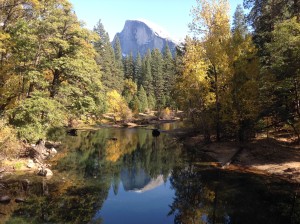Thanksgiving opens our hearts and minds to others – which is badly needed today
Fresno Bee, November 17, 2017
In 1789, George Washington proclaimed that a Thursday in November should be set aside for giving thanks. Washington’s proclamation echoed the deistic religion of his day. He acknowledged the “providence of Almighty God.” And he gave thanks to the “great and glorious Being, who is the beneficent Author of all the good that was, that is, or that will be.”
 Washington said we should be thankful for “the civil and religious liberty with which we are blessed.” He also gave thanks for good government that protects religion, while promoting science and “useful knowledge.”
Washington said we should be thankful for “the civil and religious liberty with which we are blessed.” He also gave thanks for good government that protects religion, while promoting science and “useful knowledge.”
There are some puzzles here. Science and religion often seem to be at odds these days. But Washington’s generation thought that science helped to glorify God and improve religion. Indeed, a sense of the complexity of the universe can stimulate humility, wonder and gratitude.
Washington thanks God’s providence for the blessings of liberty. But surely Washington himself had some hand in protecting religious liberty. Are liberty, science, and prosperity gifts of God, or are they the result of human effort and ingenuity?
Some may want to avoid this kind of inquiry at the Thanksgiving table. But these sort of question helps us understand who to thank and what to thank them for.
It is easy to recite a formulaic prayer or repeat a ritual of thanksgiving. It is harder – and more rewarding – to think when giving thanks. Genuine gratitude requires understanding. Thankfulness is linked to thoughtfulness. And indeed, thinking can lead to thanking.
When we count our blessings, we become reflective. That is why it is useful to list the things you are grateful for, why you appreciate these gifts, and who you thank for them. Gratitude puts us in a contemplative mood. It opens the mind as well as the heart.
Thoughtful thankfulness is sorely needed these days. We are easily distracted and quickly outraged. Many prefer anger over empathy. Resentment often overshadows affirmation. Greed makes us unappreciative. And gluttony leaves us hungry and ungrateful.
The solution is thankful thinking. We often fail to notice that good things are simple, plentiful, and easily obtained. Gratitude reminds us to savor the goods of life. It also reminds that there are others nearby whose cups are empty.
Thanksgiving thus teaches profound ethical lessons. Giving thanks opens us toward the other. It acknowledges our vulnerability and dependency.
To give thanks is to admit that good things come from outside the self and are not in our control. To give thanks is to admit that you are not alone in the world or self-sufficient. Others have helped you along the way. Once you acknowledge your own dependency, you discover compassion for vulnerable others who need your help.
These ethical lessons do not depend upon any specific religious belief. Our Thanksgiving holiday has obvious religious roots. Before George Washington, the Puritans offered Christian prayers of thanksgiving. But thanksgiving and compassion are much older than that.
Ancient cultures celebrated harvest festivals this time of year. Our Thanksgiving iconography reflects this in the cornucopia. The ancient “horn of plenty” was a Greek and Roman fertility symbol and a sign of good fortune.
It seems natural for human beings to count their blessings and give thanks this time of year. As winter sets in and the harvest is completed, it is natural to acknowledge that health and prosperity are fragile gifts. And this leads us to have compassion for those who are less fortunate.
Some thank God. Others toast friends and family. Some thank their ancestors. Others simply thank the earth.
However thanks is given, there is a psychological benefit to counting your blessings. Gratitude helps overcome resentment. It reduces anger and anxiety. Thankfulness helps us become humble, hopeful and happy.
Gratitude is also socially useful. It feels good to be thanked. And it feels good to thank others. Gratitude celebrates common values. Expressions of thanks help build and reinforce relationships.
Gratitude also breaks down egoistic pride. Open-hearted kindness develops when we acknowledge the fragility of our own good fortune. Our well-being depends upon others. The farmers grow the food we eat. A vast social network gets that food to table. The feast is more delicious when eaten with good company. And the world is better when prosperity is shared.
http://www.fresnobee.com/living/liv-columns-blogs/andrew-fiala/article185130393.html




